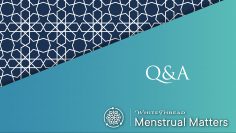
My Bleeding is Irregular
Aslmkm bismillah.I am 49 and have always has a very regular 28 day cycle With a 6-7 day menstruation. This month I had a normal 7 day bleeding beginning on the 7th March until 13 March. Then on the 21-27th March I began to bleed again. So only a 7 day clean period. This second bleed of the month was mostly like a normal flow and pain as a regular period. Some sources have indicated a slightly different colour, viscosity and flow pattern To regular period for istihaatha. Should they be treated the same? Your other article indicated permissibility or reading salaah-with a fresh wudhu with each new waqt and fasting. It did not however indicate permissibility or not of reciting Quraan. Clarification would be appreciated. JazakAllah khair .
Answer
In the name of Allah, the Inspirer of truth
When a 15-day separator is tainted by bleeding/spotting, the preceding and subsequent sets of blood will be joined together with the invalid purity to become continuous blood. For this reason, your bleeding from the 7th – 27th March will be treated as continuous. The colour, flow and viscosity of the blood, as well as any pain experienced, will not differentiate between days of menstruation (hayd) and irregular bleeding (istihada). Rather, you will apply your last valid blood (hayd) and valid purity (tuhr) to determine when you were expected to bleed; this expected place of habit is what you will count as hayd. You should continue to apply your habit for hayd and purity until you see a 15-day separator.
Please note, a valid blood refers to the days of hayd spanning between 3-10 days. This can only be used as a habit if it is not followed by irregular bleeding (istihada). A valid purity is the gap between two valid bloods, which is 15 days or more and is not mixed with any bleeding or coloured discharge.
In regard to your second question, it is permissible to recite Qur’an and perform all other acts of worship, without restriction, while experiencing istihada. From a legal perspective, istihada is similar to a nosebleed and just as you are permitted to pray salat, you can recite and touch the Qur’an. Prohibitions during hayd do not apply during istihada. It is, however, necessary to ensure ritual purity before touching the Qur’an.
And Allah knows best.



